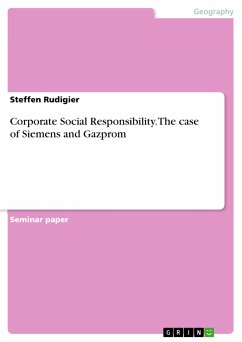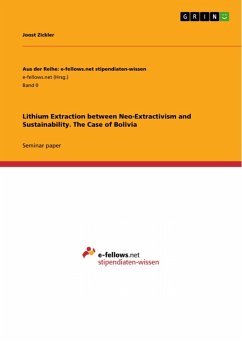Seminar paper from the year 2010 in the subject Geography / Earth Science - Physical Geography, Geomorphology, Environmental Studies, grade: 75%, The University of Liverpool (Management School), course: MBA, language: English, abstract: Issues like climate change, human rights abuses and poverty dominate our media. Often blamed for responsibility for many of the world's urgent problems, companies are increasingly expected to address them. The term "Corporate Social Responsibility" has therefore become synonymous for initiatives towards sustainable development. This report was established to examine how far corporate social responsibility and sustainable development of multinational corporations has been practiced in recent years, specifically the German Siemens Group and Russia's Gazprom which are the subjects of this investigation. The paper first highlights some key issues of the stakeholder theory and stakeholder salience model, which is then applied to determine the companies' key stakeholders. The most important ones are analysed and compared in terms of power, legitimacy and urgency. Section two deals with the evaluation of the companies' responsible business approaches, pointing out the extent to which these have increased or decreased and the underlying reasons effecting change. The final section seeks to identify the substance of the described approaches by applying the Ponte et.al typology and finally analysing them using the two contrasting perspectives "Good for Business" and "Critical Development". Findings in section one show that classifying and addressing stakeholders is fundamentally through managerial perception and the variable constitutional contexts in which the companies are enacted. The results also reveal that Siemens has to deal cautiously with a wider group of stakeholders than Gazprom, due to the different constitutional situations in Germany and Russia. Gazprom is most influenced by its main-stakeholder, the Russian Federation, whereas the power of other stakeholder groups is relatively low. The investigation of Siemens's socially responsible business approaches in section two revealed that the increasing awareness of CSR in Germany and Siemens's corruption affair were the main drivers intensifying their recent business approaches. CSR in Russia is still immature; consequently Gazprom's initiatives are limited. However, CSR is expected to increase in Russia and Gazprom as a global player must pursue international standards.
Dieser Download kann aus rechtlichen Gründen nur mit Rechnungsadresse in A, B, BG, CY, CZ, D, DK, EW, E, FIN, F, GR, HR, H, IRL, I, LT, L, LR, M, NL, PL, P, R, S, SLO, SK ausgeliefert werden.









